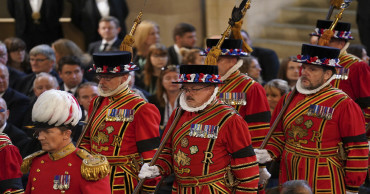Edinburgh
Public can pay respects to Queen Elizabeth at Edinburgh cathedral
Queen Elizabeth II's grandson Prince Harry hailed her Monday as a “guiding compass” and praised her “unwavering grace and dignity," as members of the public were to get the chance to pay their respects to the monarch when her coffin lies at rest at St. Giles’ Cathedral in Edinburgh.
The personal statement, posted on Harry and his wife Meghan’s Archwell website, said he cherished their times together “from my earliest childhood memories with you, to meeting you for the first time as my Commander-in-Chief, to the first moment you met my darling wife and hugged your beloved greatgrandchildren.”
Amid acrimony in the House of Windsor, Harry quit as a senior royal and moved to the U.S. two years ago. On Saturday, there was a possible sign of a reconciliation as Harry and Meghan joined his brother Prince William and sister-in-law Catherine in meeting mourners outside Windsor Castle.
Also read: Rules issued for paying respects to the queen
Harry's statement came at the start of another day steeped in the historic pageantry and pomp that follows the death of a British sovereign.
King Charles III was starting the day speaking to lawmakers at Parliament in London before flying to Scotland.
Hundreds of lawmakers crowded into the 1,000-year-old Westminster Hall at the Houses of Parliament for a service in which Parliament will offer its condolences to the king, and he will reply.
A trumpet fanfare greeted the king and his wife Camilla, the Queen Consort, as they entered the hall, which was packed with hundreds of legislators.
Also read: Queen’s coffin leaves Scottish estate for last journey back to London
The Speakers of the House of Commons and House of Lords were offering condolences on the death of Queen Elizabeth II, and Charles will make a speech in reply.
The hall, with its magnificent hammer-beam roof, is the oldest part of the parliamentary complex — a remnant of the medieval Palace of Westminster that once stood on the site.
The ceremony was being held in Westminster Hall because monarchs are not allowed inside the House of Commons. That rule dates from the 17th century, when King Charles I tried to enter and arrest lawmakers. That confrontation between crown and Parliament led to a civil war which ended with the king being beheaded in 1649.
On Sunday, thousands of people lined streets and roadsides as the oak coffin was borne from the late queen's beloved Balmoral Castle summer retreat, where she died on Thursday, to Edinburgh.
The new king will fly to Edingburgh later and will walk behind his mother's coffin as it is slowly transported from Holyroodhouse to St. Giles' Cathedral, where the crown of Scotland will be placed on the coffin ahead of a service of prayer and reflection on the life and 70-year reign of the widely cherished monarch.
The queen's coffin will lie at the cathedral for 24 hours, giving members of the public a chance to file past and pay their respects. On Tuesday, it will be flown to London where the coffin will lie in state at the Houses of Parliament Palace from Wednesday afternoon until the morning of the funeral on Sept. 19.
Authorities already have issued rules and guidelines for people wanting to pay their respects in London, with a long queue expected.
After visiting Scotland, Charles embarks on a tour of the other nations that make up the United Kingdom — he visits the Northern Ireland capital, Belfast, on Tuesday and Wales on Friday.
Harry's statement ended on a poignant note alluding to the death last year of his grandfather, Prince Philip, saying that “We, too, smile knowing that you and grandpa are reunited now, and both together in peace.”
3 years ago

